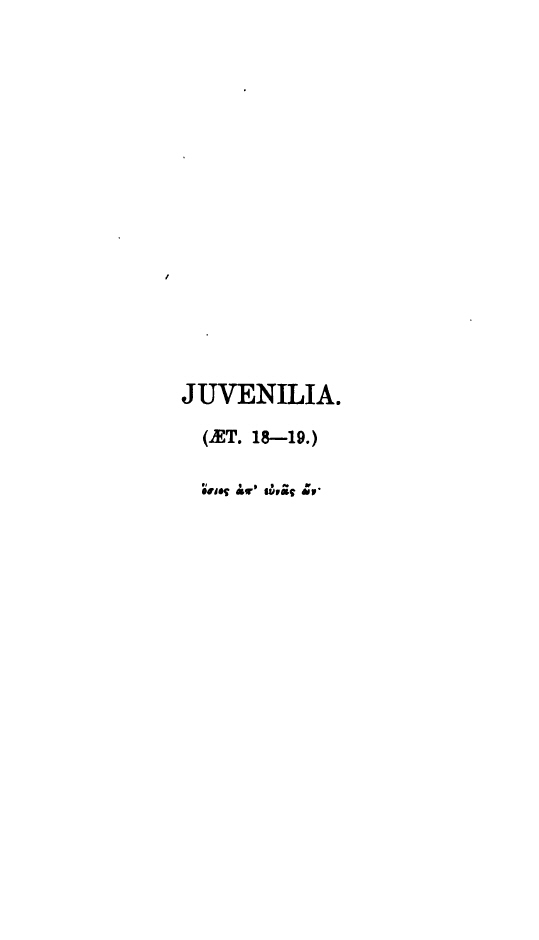ROBERT WILLIAMS BUCHANAN (1841 - 1901)
|
ROBERT WILLIAMS BUCHANAN (1841 - 1901) |
|
|
|
|
|
|
|
|
{Idyls and Legends of Inverburn 1865}
185 A MELODY.
THE LITTLE FAY. YOU are the grey grey Troll,
THE TROLL. When the summer day
THE LITTLE FAY. When the summer day
THE TROLL. When the night is blue,
THE LITTLE FAY. When the night is blue,
THE TROLL. Then why art thou so frail?
THE LITTLE FAY. O tell me, grey grey Troll,—
THE TROLL. With a soul love-laden,
THE LITTLE FAY. O see, thou grey grey Troll,
THE TROLL. With a soul love-laden,
THE LITTLE FAY. You have told me why
[Note:
196
JANUARY WIND.
I. THE wind, wife, the wind; how it blows, how it blows;
II. The wind, wife, the wind; how it blew, how it blew;
III. The wind, wife, the wind; how it blows, how it blows!
IV. The wind, wife, the wind; now ’tis still, now ’tis still;
V. The wind, wife, the wind; up again, up again!
199 II.
I. SHOWERS, showers, nought but showers, and it wants a week of May,
II. Showers, showers, silver showers, murmur and softly sing,
201 III.
I. SUMMER Moon, O Summer Moon, across the west you fly,
II. Summer Moon, O Summer Moon, you throw your silver showers 202 III. Summer Moon, O Summer Moon, now wind and storm have fled,
IV. Summer Moon, O Summer Moon, his head is on his arm,
V. Summer Moon, O Summer Moon, across the lift you go,
203 IV.
I. THE cold, cold snow! the snow that lies so white!
II. ’Tis cold, cold, cold, since Jeanie went away,
III. And tick! tick! tick! the clock goes evermore,
IV. ’Tis cold, cold, cold!—’twere better she were dead,
V. The cold, cold snow! the snow that lies so white!
[Notes:
205 THE preceding poems, both the Idyls and the Legends, are more or less dramatic—in so far as the writer, in no instance save the “Preamble,” speaks in his own person. This leads to a variety of style, which may or may not be a recommendation. All the scenes are Scottish; but the speakers, with one exception, are educated men, who, although they sometimes have recourse to Scottish phrases and idioms, do not habitually employ the vernacular. The Weaver, who tells the tale of “Poet Andrew,” uses Scottish words liberally, but it has not always been thought necessary to represent his actual pronunciation. To print “auld” for “old,” and “cauld” for “cold,” “o’” for “of,” and the like, is to confuse, not vivify or verify, the text; and, indeed, the actual pronunciation is arbitrary and contradictory in the extreme. The author subjoins a brief glossary of the few words and phrases with which English readers can have any difficulty. |
|
|
||||||||||||||||||||
 |
|
[Note:
183
UNDER green branches I lie, For the branches, that, here and there, Face upward, calmly I rest 184 My mood would be dreamily wise I close my eyes in vain, With a motion wind-bequeath’d, White as a flock of sheep, Yonder with dripping hair, One like a Titan cold, One like a bank of snows, Motion such as you see Beautiful, stately, slow, Ay, into my heart there throng 187 Do whatever I may, When the troublous motion sublime O sweet, very sweet, to lie For yonder a dark ship furls ’Tis faded away, and lo! In fierce, precipitate haste The sunbeam fading, behold But oppress’d with pensive fears, Far, far away, snow-white, Then, to meet a fair foe, speeds 190 And she wanders undismay’d Which, opening flower-like, shows On the verge of this fairy land Oh! is it not sweet, sweet, sweet, But shadows lengthen around, Homeward;—but when the pale Or wander, side by side Or, ’mid trumpets murmuring loud,
[Note:
UNDER green branches I lie, For the branches, that here and there Face upward, calmly I rest My mood would be full of grace I close my eyes in vain, With a motion wind-bequeath’d, White as a flock of sheep, Yonder with dripping hair, One, like a Titan cold, One like a bank of snows, A motion such as you see Beautiful, stately, slow, Into my heart there throng Do whatever I may, When the troublous motion sublime Oh! sweet, very sweet, to lie For yonder, a dark Ship furls ’Tis faded away, and lo! In fierce, precipitate haste The sunbeam fading, behold Oppress’d with fanciful fears, Far, far away, snow-white, Then, to meet a far foe, speeds And she wanders undismay’d Which, opening flower-like, shows On the verge of this fairy land Oh! is it not sweet, sweet, sweet, But shadows lengthen around, Homeward;—but when the pale Or wandering side by side Or, ’mid trumpets murmuring loud, _____
Idyls and Legends of Inverburn continued or back to Idyls and Legends of Inverburn - Contents
|
|
|
|
|
|
|